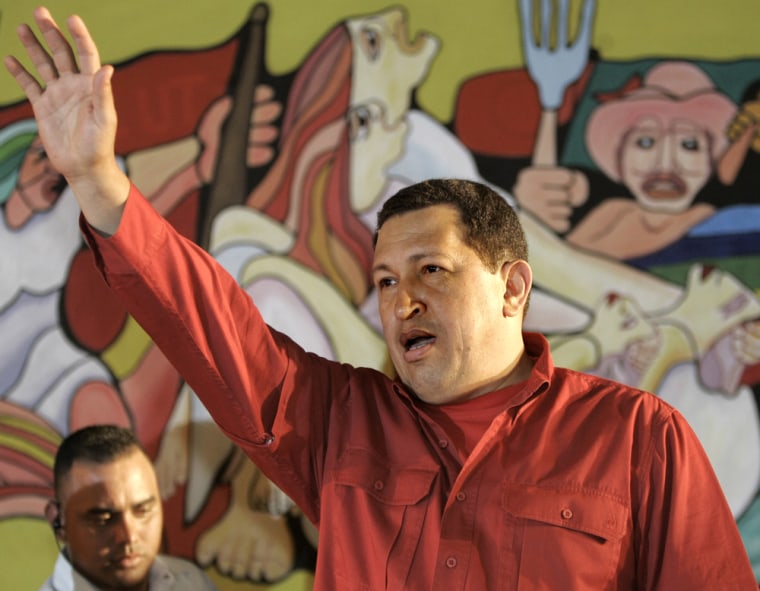The United States is imposing a ban on weapons sales to Venezuela because of what it claims is a lack of support by President Hugo Chavez’s leftist government on counterterrorism efforts, the State Department said Monday.
The Bush administration will also list Venezuela — the fifth-largest supplier of oil to the United States — as a “country of concern” in the war on terrorism, an official told NBC News, speaking on condition of anonymity.
The label is not as severe as being listed as a “state sponsor of terror,” but it reflects what the State Department reported in April about Venezuela in its annual terror report.
“Venezuelan cooperation in the international campaign against terrorism remained negligible,” the report said. “President Hugo Chavez persisted in public criticism of U.S. counterterrorism efforts, publicly championed Iraqi terrorists (and) deepened Venezuelan collaboration with such state sponsors of terrorism as Cuba and Iran.”
The report also accused Chavez of having an “ideological affinity” with two leftist guerrilla groups operating in neighboring Colombia, the FARC and the National Liberation Army. The United States considers both to be terrorist organizations.
‘ Doesn't matter to us’
Chavez brushed aside the arms ban, saying “this doesn’t matter to us at all.”
The Venezuelan leader, on a visit to London, also said his government would not respond with punitive measures such as travel restrictions.
“It’s the empire and it has a great capacity to do harm to the countries of the world,” he said, referring to the U.S. as “irrational."
For almost a year, there has been a nearly total lack of cooperation with anti-terrorism, State Department spokeswoman Darla Jordan said. As a result, U.S. sales and licensing for the export of defense articles and services to Venezuela, including the transfer of defense items, will not be permitted, she said.
War of words
Relations between Chavez and the Bush administration have sharply deteriorated. Chavez has called Bush a “terrorist,” and denounced the U.S.-led war in Iraq.
Earlier Monday, Chavez rejected U.S. claims that Iran’s nuclear program is aimed at producing a nuclear bomb. “I don’t believe that the United States or anyone else has the right ... to prohibit that a country has nuclear energy,” he said at a news conference in London.
Chavez, an ally of Cuba’s Fidel Castro, has repeatedly accused the United States of trying to overthrow him to seize his country’s vast oil reserves. U.S. officials have denied that and accused him being a threat to democracies in the region.
‘Final hours of the North American empire’
Chavez counters that the United States is the country to be wary of.
In a two-hour speech Saturday while in Vienna, Austria, for a summit on Latin America, Chavez said that the “final hours of the North American empire have arrived.”
“So now we have to say to the empire: ‘We’re not afraid of you. You’re a paper tiger,’” he said.
The U.S. sanctions came the same day that the Bush administration said it was restoring diplomatic ties with Libya, whose president, Moammar Gadhafi, had once been vilified by the United States.
Coincidentally, Chavez and Gadhafi will be meeting in Tripoli on Tuesday.
Gadhafi, whose country is a major oil producer like Venezuela, has in recent years toned down fiery anti-American rhetoric and opened its industry to Western investment. Chavez, a self-styled socialist revolutionary, has by contrast led a campaign to tighten state control over his nation's energy sector.
‘No oil’ if U.S. attacks
Venezuela is the world’s No. 5 oil exporter and relies on crude sales for about half of state revenues. High oil prices have helped Chavez pour billions into projects for the poor as part of his proclaimed socialist revolution.
Chavez has said Venezuela will continue exporting petroleum to U.S. ports, “unless they attack us, in which case there will be no oil.”
But he is also looking to diversify away from the United States as he seeks to increase oil exports to Latin America, the Caribbean and energy-hungry China.
